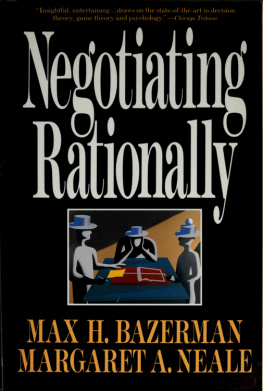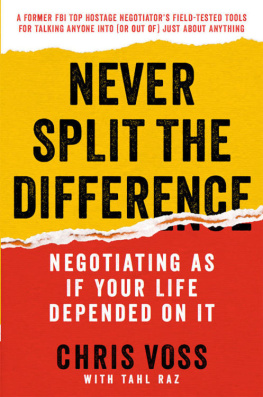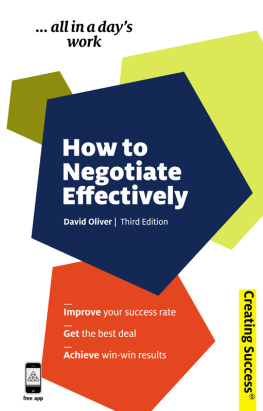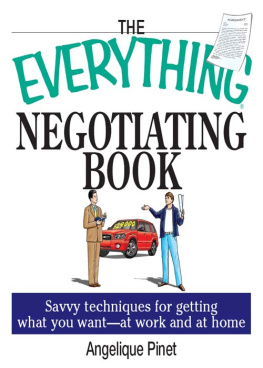Thank you for buying this eBook,
published by AudioInk Publishing
To learn more about AudioInk Publishing you can visit us at:
www.AudioInk.com
P.O. Box 1775
Issaquah, WA 98027
www.AudioInk.com
Copyright 2013
All rights reserved.
In accordance with the U.S. Copyright Act of 1976, the scanning, uploading, and electronic sharing of any part of this book without the permission of the publisher constitutes unlawful piracy and theft of the authors intellectual property. If you would like to use material from the book (other than for review purposes), prior written permission must be obtained by contacting the publisher at . Thank you for your support of the authors rights.
Distributed by AudioInk Publishing
eBook Conversion by AudioInk Publishing
For ordering information, please contact AudioInk +14255266480
Weintraub, Judy.
The Essentials of Negotiating Effectively
ISBN: 978-161-339-5097
For further information contact AudioInk +14255266480 or email
Most people dislike negotiations. This may stem from fear that they wont get what they want, or that their requests will be rejected, or that they will appear weak.
Negotiating effectively, however, is based in large part on your state of mind. If you go into a negotiation with confidence, you are more likely to achieve your objectives.
If you are timid in your approach or demeanor, you are more likely to be taken advantage of. This SkillBites contains some valuable tips to provide you with greater assurance when you negotiate, and thus improve your chances of negotiating effectively. In particular, the pamphlet covers the following topics:
- Preparing for a negotiation;
- Finding opportunities to practice negotiating;
- Delivering an effective opening proposal;
- Building rapport and trust;
- Conducting the negotiations;
- Dealing with tactics and difficult behaviors;
- Responding to common rejections;
- Making concessions;
- Addressing gender and cultural differences; and
- Documenting the results
Good preparation is critical to being able to achieve your objectives in a negotiation. Preparation consists of 3 main steps: gathering information, identifying your options, and developing and practicing your proposal. Each of these will be addressed in turn.
The more important the negotiations, the more time you will want to spend at this stage. Some of the information you will want to gather includes the following:
- Your goals: What do you want to achieve in the negotiations? Why is this important to you? Why would it be fair for the other side to give this to you?
- The other sides position: What do you think the other side wants? What objections do you think they might have to giving you what you want?
- Your leverage: What do you have that they might want? What is their leverage?
- The other negotiator: Who will be negotiating on behalf of the other side? What is their negotiating style? What is their background?
- Others impacted: Is there anyone else who might be impacted by the negotiation? If so, should you obtain their input?
- External Factors: Are there any external factors you need to consider, such as industry standards, economic conditions or possibly currency fluctuations?
Rarely is there only one acceptable outcome in a negotiation. Try to think of as many different desirable outcomes as possible. You may find that there are several options that are beneficial for you, which gives you a greater likelihood of getting a good outcome in the negotiation.
For instance, if you are buying a new car, the price is certainly one factor, but there are several other options that could have significant value for you, such as a discount on some desirable accessories, or a longer warranty period, or free oil changes, or free loaners when your car needs maintenance. If you are trying to negotiate a salary increase, some other options might be a review in 6 months with a salary increase if you meet a specified set of goals, stock options, a higher title, flex time, or more vacation time.
Once you have identified the options, you should prioritize them based on their value to you. What would be the best outcome? What is realistic? What would be the minimum you would accept before walking away? You should also consider what your alternatives are if the negotiation fails. Then consider the options you have come up with from the perspective of the other side. What do you think their objections might be, and how will you address those objections? What might their options be that they may ask you for, and what would be your response to their request?
Going through this exercise will broaden your perspective and give you greater flexibility in the negotiations, in the event that the other side cannot or will not accept your best case scenario.
Many people start with a weak offer to avoid rejection. To get what you want, you should develop your proposal around your optimal solution. While you may not get everything you want, you will get a better result than by starting with something less substantial. Be aware, however, that if you start with a position that the other side views as unreasonable, you might jeopardize the whole negotiation.
After you identify what you want, you then want to explain why it is fair and reasonable. Include how your proposal might meet the other sides interests. Anticipate any objections they might have and address those as well. Addressing objections prior to the other side raising them tends to deflate the objections.
How you present your proposal plays a major role in whether it is accepted. A demand is more likely to be rejected even if it meets the other sides needs. Practice giving your proposal so that it sounds smooth, but not too rehearsed. Posture, tone of voice and other non-verbal signals that you consciously or unconsciously transmit are important make sure to sit up, not slouched. Your voice should project to reflect confidence, and not drop at the end of sentences. Get feedback from others as to both the substance and the tone of your delivery. Were they persuaded by your presentation? Did they feel you came across as sincere, confident and credible? Ask them to take on the role of the person you are going to be negotiating against. If you can respond to hard questions from them, you should be prepared to respond to most issues that could come up during the negotiation.
Most people have trouble asking for what they want. If you have this difficulty, try practicing your negotiation skills in small, unimportant transactions where it doesnt matter if you dont get what you are asking for. There are lots of opportunities to practice: if you are going on vacation or on a business trip, ask your hotel for a discount, or a higher class room. If you are renewing a newspaper or magazine subscription, ask for a discount. If you get a credit card statement in the mail showing a finance charge for late payment, call and ask for the charge to be waived. You might have to wait on hold for 15 minutes, but you can be doing something else while waiting. Many credit card companies routinely waive those charges when the customer asks (so long as you dont do this very often).
When you are buying something, ask for a discount, or free shipping, or a longer warranty or something else of value. If you get turned down, you can decide whether you want to pursue it further, perhaps by asking for the persons manager, or just accept their response and move on. Think of it as a training exercise, so you dont feel bad getting rejected. In any event, you dont really lose anything if your request gets turned down, as the result is the same as if you hadnt asked. But unless you ask, you wont get anything better. And the more you practice asking, the more comfortable you will become, which will stand you in good stead when you have to negotiate something important.
Next page











